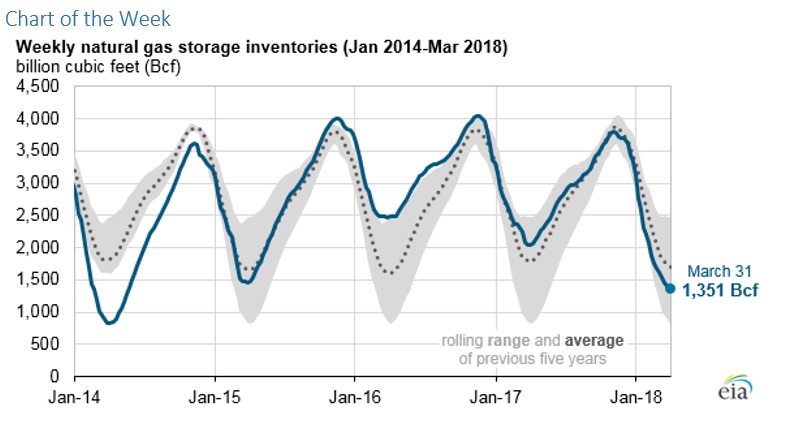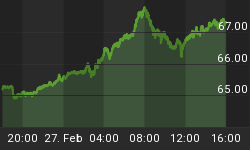Monday, April 16, 2018
Oil drops as Syria fears abate. Oil prices spiked last week as the U.S. considered airstrikes against Syria, threatening to further destabilize a region already beset with conflict. However, oil eased back on Monday after it was clear that the U.S. opted for a narrower military option that limited the risk of escalation. Oil prices had climbed nearly 10 percent in the days leading up to the strike, but fell back on Monday.

(Click to enlarge)
- U.S. natural gas inventories are at their lowest point in four years for this time of year. The end of winter is a seasonal low point for gas stocks, but the winter of 2018 saw an extraordinary drawdown in natural gas from storage.
- As of March 31, 2018, which marks the end of the drawdown season, the U.S. had 1,351 billion cubic feet (Bcf) in storage, the lowest level since 2014. The figure is also 21 percent lower than the five-year average.
- Typically, that would represent an incredibly bullish force on natural gas prices, but the U.S. is expected to post explosive growth in upstream gas production, which should replenish stock levels.
Markets
NAFTA negotiations see progress. The U.S., Canada and Mexico are reportedly making progress on auto industry rules contained within NAFTA, boosting the odds of a successful renegotiation of the treaty. The Trump administration has offered some concessions on the proportion of content required to be made in North America. “I think it’s moving in the right direction,” Ann Wilson, senior vice president at the Motor & Equipment Manufacturers Association, told the WSJ. “We have a few technical things to work out.” Meanwhile, Mexico’s president said that a deal could be reached within the next few weeks. Related: 3 Stocks to Watch This Earnings Season
Russia stocks fall again on more U.S. sanctions. Russia’s stock market has been on a wild ride recently, largely due to U.S. sanctions. Washington promised yet another round of sanctions this week, this time over Russia’s alleged role in helping Syria use chemical weapons. Russia’s Moex index dipped on Monday on the news, posting losses of 4 percent over the past month.
Corporate debt across retail, energy and telecom a concern. The debt binge in Corporate America over the past decade, in part because of rock bottom interest rates, represents a threat to investors in these sectors. Top retail companies have seen their credit ratings cut to junk territory. The NYT points to the ProShares Long Online/Short Stores fund, an ETF that goes long on online retailers while also shorting brick and mortar retailers. S&P estimates that more than $4 trillion in corporate debt will need to be refinanced – which will have to happen at higher interest rates – by 2022.
Commodities
U.S. sanctions scramble London Metal Exchange. U.S. sanctions on Russian aluminum company Rusal “have left buyers scrambling for alternative sources of metal,” according to the FT. It is also causing problems for the London Metal Exchange (LME), which said that it would no longer accept aluminum produced by Rusal after April 17. The move sparked a rush to withdraw non-Russian metal from LME’s warehouses, the FT reports, and a third of LME’s aluminum supply in storage could be released onto the market. The FT says there is a danger to the LME as a benchmark for global aluminum prices. At the same time, the prospect of Rusal being blocked from western markets has led to a spike in aluminum prices by 3.5 percent on the LME, the highest in over six years.
Gold could rise to $1,450. Slower economic growth, combined with a weaker U.S. dollar and worsening volatility in global stock markets all could help push up gold prices, according to Steffen Grosshauser at BullionVault. Also, a trade war between the U.S. and China could provide safehaven interest for gold. "Although further rate hikes by the Fed are a headwind, they are already largely priced in," Metals Focus director Philip Newman said last week. Still, Dutch banker ABN Amro sees gold prices falling in the short-term, largely because speculative bets look overstretched. ABN sees gold dropping to $1,200 by the end of the year.
Cobalt supplier in talks with Chinese car companies. Cobalt 27 Capital Corp., the largest private owner of cobalt, said it is in negotiations with two Chinese automakers for deals on cobalt supplies that would be used on electric vehicles. Cobalt 27 said it has held at least 17 meetings in Chinese cities in the coming days to discuss long-term supply contracts. “There’s a lot of interest and it is natural because it is where all this will happen,” Cobalt 27’s CEO Anthony Milewski told Bloomberg. “China is going to be the world leader of electric vehicles.”
Energy
Oil market already balanced, but trade war poses risks. On Friday, the IEA said that OPEC had probably already achieved its mission of balancing the oil market, based on the fact that the crude oil inventory surplus has likely been eliminated. Yet, the agency also warned that the trade war between U.S. and China poses a risk to oil demand, which could upend forecasts of a tightening market for the remainder of the year.
Canada could lend financial support for crucial pipeline. Kinder Morgan Canada (TSE: KML) suspended work on its Trans Mountain Expansion pipeline, citing unpredictable political risk. But in a sign of how important the government views the pipeline to the Canadian oil industry as well as the country’s economy, Prime Minister Justin Trudeau said on Sunday that the federal government would offer financial support to push the project forward. The pipeline would add 590,000 bpd of capacity if completed, a critical lifeline for the Canadian oil industry, which is having trouble finding a way to get barrels out of the country.
Related: The U.S. Has A $1.4 Trillion Pension Problem
Frontrunner in Mexican presidential election won’t rollback energy reform. An economic advisor to the frontrunner in Mexico’s July presidential election said that the contracts signed under the current government with international oil and gas companies were “well done.” The oil and gas industry has feared that the prior opposition to the energy liberalization from Andres Manuel Lopez Obrador might mean a reversal in energy laws should he be elected president. But Lopez Obrador has sent signals that his government would not follow through on radical actions to roll back the energy reform. “We will not reverse the energy reform,” Alfonso Romo, a business titan and advisor to Lopez Obrador said.
Cryptocurrencies
Alibaba subsidiary Taobao bans cryptocurrencies. Taobao, a subsidiary of Chinese eCommerce giant Alibaba, banned cryptocurrencies, ICOs and other virtual currency-related services. Taobao, often likened to the eBay of China, also banned any product or service that uses blockchain. The company cited the recent bans on cryptocurrency services by the People’s Bank of China.
Japan emerging as cryptocurrency giant. While other countries are moving to restrict the proliferation of cryptocurrencies, Japan is becoming a haven for digital currencies and blockchain companies. It isn’t that Japan is leaving the sector unregulated. On the contrary, Japanese regulators have been proactive at defining the rules of the game while not banning them, allowing cryptocurrency and blockchain investment to flourish.
Bitcoin rallies 20 percent, hopes of more. Some crypto analysts have speculated that the bear market for Bitcoin and other digital currencies in recent weeks was at least in part the result of the looming April 17 U.S. tax deadline. For investors who made money during the wild ride in 2017, they would have needed to use some of those winnings to pay federal taxes. "We may look back on this time as the 'Crypto Tax Crisis of 2018,' as thanks to tax liabilities we're witnessing the most concentrated period of net fiat outflows that the crypto asset ecosystem has experienced in its short life," Chris Burniske, a partner at Placeholder VC, and Jonathan Cheesman wrote recently. Still, there are reasons to question this logic. Meanwhile, Bitcoin rallied more than 20 percent over the past two weeks, although prices were down on Monday.
By Josh Owens for Safehaven.com
More Top Reads From Safehaven.com:
















